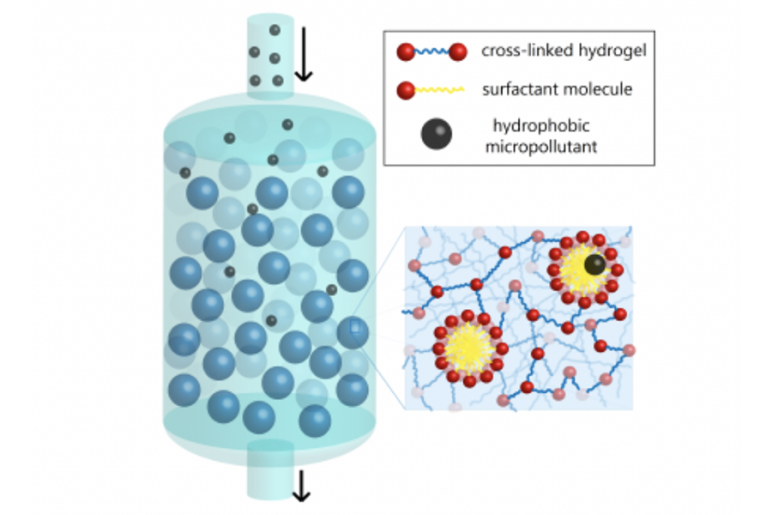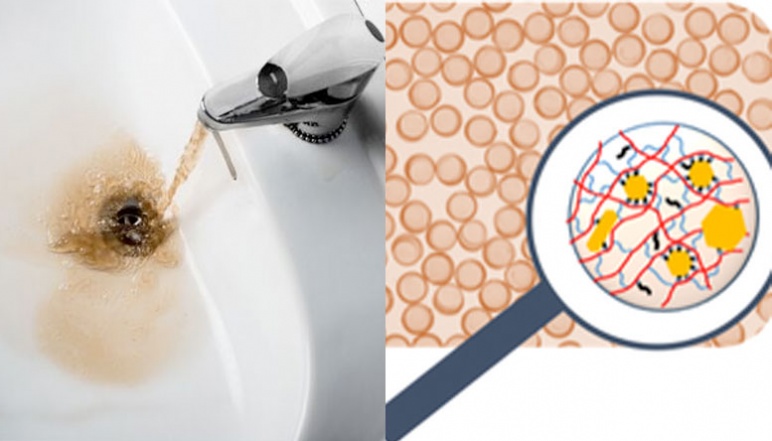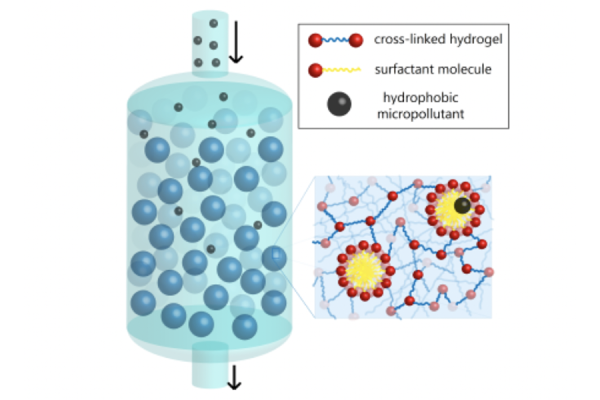Our Research Microparticle systems for the removal of organic micropollutants

Schematic diagram of micelle-laden hydrogel particles in a packed bed for the removal of micropollutants.

Photo Credit: iStock Images, Doyle research team
Principal Investigator
Patrick Doyle
- Robert T. Haslam (1911) Professor of Chemical Engineering
- Department of Chemical Engineering
Pat Doyle is a chemical engineering professor at MIT with broad research interests ranging from fundamental studies of single DNA molecules to microfluidic devices, to water purification, to the design of new technologies for spatial detection of miRNA. He is also the co-founder of the startup companies Drosera Biotechnologies, Firefly Bioworks (acquired by Abcam in 2015), and Motif Micro (acquired by YPB Systems in 2018). He works closely with many companies as either a consultant, SAB advisor or through sponsored research in his lab.
Challenge:
Can we remove micropollutants from water using a continuous process with components which are easily regenerated?
Research Strategy
- Develop a microparticle-based platform to remove a broad class of organic micropollutants from waste water
- Demonstrate regeneration of the particles at mild conditions
- Develop a fluidized bed device for water treatment
Project description
Removing organic contaminants from water is a key environmental challenge. Wastewater from industrial and agricultural processes often contains solvents, petrochemicals, lubricants, pharmaceuticals, hormones, and pesticides, which all can enter natural water systems. While these micropollutants may be present at low concentrations, they can still have a significant negative impact on aquatic ecosystems as well as human health. The challenge is in detecting and removing these micropollutants, because of the low concentrations in which they occur.
This seed project is developing a system to remove a variety of micropollutants, at even the smallest concentrations, using a special hydrogel particle that can be “tuned” to remove selective contaminants. In addition to being highly selective, it is also a cleaner and more efficient filtration solution, as these hydrogels do not require the harsh conditions and cleaning chemicals that many existing filtration systems require. Leveraging the flexibility of these particles, this technology can improve the speed, precision, efficiency, and environmental sustainability of industrial water cleaning systems, and improve the health of the natural water systems upon which humans and our surrounding ecosystems rely.
Outcomes
- Developed affordable, sustainable soap-based systems to eliminate emerging micropollutants in water
- Engineered microparticles to have a lower carbon footprint than activated carbon and outperform activated carbon for removal of low concentration micropollutants
- Created methods to regenerate the particles
Publications
Coarse-grained molecular dynamics simulations of immobilized micelle systems and their interactions with hydrophobic molecules
Devashish Gokhale, Ian Chen, and Patrick S. Doyle, Soft Matter, 2022
Micelle-laden hydrogel microparticles for the removal of hydrophobic micropollutants from water
Devashish Gokhale, Ian Chen, and Patrick S. Doyle, ACS Applied Polymer Materials, 2022
News
Additional Details
Impact Areas
- Water
Research Themes
- Water Purification & Desalination
Year Funded
- 2019
Grant Type
- Seed Grant
Status
- Completed


